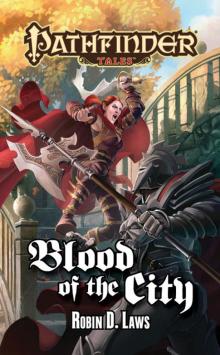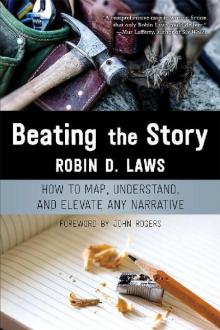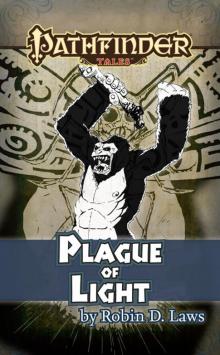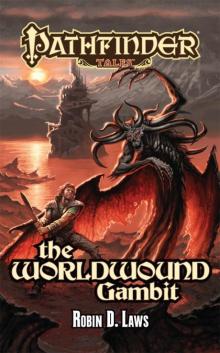- Home
- Robin D. Laws
Plague of Light
Plague of Light Read online
The Pathfinder Tales Library
Novels
Prince of Wolves by Dave Gross
Winter Witch by Elaine Cunningham
Plague of Shadows by Howard Andrew Jones
The Worldwound Gambit by Robin D. Laws
Master of Devils by Dave Gross
Journals
Plague of Light by Robin D. Laws
Prodigal Sons edited by James L. Sutter
The Compass Stone: The Collected Journals of Eando Kline edited by James L. Sutter
Hell's Pawns by Dave Gross
Dark Tapestry by Elaine Cunnningham
Short Stories
"Guns of Alkenstar" by Ed Greenwood
"The Ghosts of Broken Blades" by Monte Cook
"The Walkers from the Crypt" by Howard Andrew Jones
"A Lession in Taxonomy" by Dave Gross
"The Illusionist" by Elaine Cunningham
"Two Pieces of Tarnished Silver" by Erik Mona
"The Lost Pathfinder" by Dave Gross
"Noble Sacrifice" by Richard Ford
"Blood Crimes" by J. C. Hay
"Certainty" by Liane Merciel
"The Swamp Warden" by Amber Scott
"The Secret of the Rose and Glove" by Kevin Andrew Murphy
"Lord of Penance" by Richard Lee Byers
"Plague of Light" © 2011 by Paizo Publishing, LLC. All rights reserved. No part of this publication may be reproduced, stored in a retrieval system, or transmitted in any form or by any means digital, electronic, mechanical, photocopying, recording, or otherwise, or conveyed via the Internet or a website without prior written permission of the publisher, except in the case of brief quotations embedded in critical articles and reviews.
Paizo Publishing, LLC, the Paizo golem logo, and Pathfinder are registered trademarks of Paizo Publishing, LLC; Pathfinder Roleplaying Game, Pathfinder Campaign Setting, and Pathfinder Tales are trademarks of Paizo Publishing, LLC.
Story by Robin D. Laws.
Art by Claudio Casini.
Cover design by Crystal Frasier.
Paizo Publishing, LLC
7120 185th Ave NE, Ste 120
Redmond, WA 98052
paizo.com
ISBN 978-1-60125-398-9
PZOTEB0018
Originally published in serialized form in Pathfinder Adventure Path #37–42.
Chapter One: On Glowing Wing
When the jungle speaks, it never tells all.
Others may hear its words, or sense its wants. I read its signs. These are present in the hooting and clucking of monkey troops in the treetops. I find them in the scurrying of insects across the forest’s hard dirt floor. In the chittering of parrots, the crack of woodpecker bills plunging into the trunks of trees. In the shifts of billowing heat in the pressing, humid air. The smells of rotting fruit and crumbling bark.
Dawn comes, trading darkness for morning shadow. Scant light penetrates the jungle canopy a hundred feet above.
There is danger here, the jungle tells me. Whether I determine its nature in time—that is my test. To prosper amid its hunger, I must demonstrate my capacity to sense and survive. To again prove myself the eater, not the eaten.
My eyes seek prowling beasts. As expected, there are none. Only scattered scrub bushes dwell in the blanket of shade laid down by the great sky-seeking trees. They offer poor hiding places for ambushing leopards. A boar or hyena pack would easily yield itself to view. At worst, a dangling liana might conceal a young viper, wrapped around it and sharing its woody coloration.
It is what I can’t hear that alarms: the sound of people. Though faint, I should be able to make it out by now. I am on my way to my adopted village, Ngali. There should be the low murmur of dawn-time conversation. The grinding of pestle against bowl, as the women make pasteroot into flour. Children should be laughing. From the direction of the village I hear only its chickens, and the distressed bark of a dog. And a distant hum.
Flies. It is the buzzing of flies.
Heart quickening, I speed my pace toward the clearing where the Ngali huts and storehouses stand. I overleap an outcrop of rain-smoothed rock, dash through cottony webbing strung between lianas by a fist-sized spider.
When I was exiled from my own tribe, the Ngali gave me shelter. Their great father, M’patika, served me palm wine and told me both their outer and inner myths. Their great mother, Nawapo, ladled out boar soup, and told me my bearing reminded her of her son, before the foreign fever took him. With the Ngali’s senior hunters, Shokamb, Wabara, and Bibaang, I tracked duikers, speared crocodiles, and faced a demon-heart jaguar. Once M’patika offered to perform the ritual of rebirth, and make me new again as a Ngali. Though honored, I could not turn my back on who I had been and what I had done. He said to me, “You are of the wandering tribe now, Xhasi, but later, you will be ready, and we will claim you then.” Then he smiled and placed his rough, firm hand on my shoulder.
And now I rush from beneath the canopy into the clearing and see the Ngali slaughtered. Their bodies lie strewn as if they were taken unawares while performing their morning tasks. Fresh corpses dangle from the thresholds of huts, and from the communal storehouse.
All have been taken. Children, women, and men. No defense was mounted. Spears hang in their racks, shields propped beneath them. M’patika lies face down on the porch of his talking hut; I recognize him by the width of his shoulders and his deep green skirt. Nawapo slumps inside. I see her eyeless face and shudder.
No weapon, Mwangi or foreign, performed this act. This is not the predation of beasts. The bodies of my friends have not been bitten, clawed, or trampled. What was flesh is now red pulp, hanging from the bone. Only magic could have done this—and strange magic, too.
I see the magician step out from behind M’patika’s hut. He carries a wizard’s artifact, a complicated instrument of yellow-brown metal. It is a wheel filled with other wheels, which turn upon and inside one another. Their action confuses the eye.
The man is an outlander, his pale northern skin reddened and flaked by the heat of our nearer sun. He is new to the Expanse: he has yet to abandon his steel armor. Sweat darkens his straw-colored hair, pasting it to his forehead. Hair like the husk of a grobfruit ashamedly hides the lower portion of his face.
When he sees me I have already sprung into the air. He reaches for a blade at his hip, but before sword can clear scabbard, I am on top of him. His device falls into blood-muddied dirt, and my knees pin his elbows. He thrashes his legs, but I am well positioned and strong, and he cannot throw me off.
Through a haze of fury, I behold his protesting face. It sputters pleading words. He babbles in the so-called “common language.” The foreigners credit its words to themselves, even though it was the river otter who invented it, and we Zenj of the jungles the first two-legged beasts to learn it. I could understand him, but do not bother. The thunder of rushing blood is all that I can hear.
The rage is in me, and I raise up my spear, ready for the killing blow. In my mind’s-eye, the act of righteous butchery performs itself. I envision the tip of my blade piercing his winter-born throat. Beneath me, the spell-maker will shudder and die. He will die on Ngali land, and will go to the Ngali ghostlands, to serve the spirits of my friends as a wretched slave, until that nether-realm day when all spirits fade forever.
I tighten fist around spear haft. But the thought of Ngali ways brings to mind the code I was raised with. Despite my exile, I still cling to it. In this adherence lies my last remaining link to my own tribe, the Ara.
A life taken is a debt incurred. This is what Ara, the first hero, taught his descendants, who took his name. When a person takes another’s life, he accepts all of his obligations, and must discharge them until the end of his days. He must liv
e his victims’ lives for them.
The killing price weighs heavily on me already. Twice have I incurred it. Two sets of obligations I must shoulder. The first cost me my place in my tribe. The second forces me to dictate detailed reports and have them sent to people I will never meet, in a dimly imagined land I will never see. Such is the price of taking a Pathfinder’s life.
Of this spotty outland wizard, whose throat I now stand ready to pierce, I know nothing. Of the debts I would bear, I can only guess. I stay my hand.
I’ll find a punishment for him that costs him more than it does me.
Wrath draining from shaking limbs, I find the meaning in his heavily accented jabbering.
“I didn’t do this!” he cries.
I pin him tighter. The buzzing of carrion flies grows louder, more insistent. “If I spare you, it isn’t because I trust the words of foreign sorcerers.”
The northerner grunts in disbelief. “Sorcerer? You spout nonsense, jungle man.”
He follows my gaze to the mysterious instrument.
“That? That was given me by our prophet-for-hire, to figure out what’s causing this.”
“Causing this?”
The northerner stops struggling, letting his head wearily fall back into the mud. “The firefly plague.”
I parrot his words, to be sure I heard them right.
“Yes, firefly plague. That’s what killed these people—a swarm of carnivorous, glowing bugs.”
“Continue,” I say.
“This attack is but one of many. The plague has hit us in Free Station, three times now. I am Thorold of Ulfven. I work for the Aspis Consortium. Let me up and I’ll tell you the rest.”
The name of the Consortium grants me little ease. That organization’s greed has done much to harm the Mwangi Expanse and its peoples. Yet in these words rings the possibility of truth. I remove the sword from his belt and slowly stand. He keeps his hands in view as he weaves to his feet.
“You are up,” I say. “Now tell me of this firefly plague.”
“The insects come from the dark of night, in glowing swarms. They feast on flesh, tearing it from the bone, as you see with these poor souls here. They were your people?”
“In the jungle, heat can be more dangerous than blades.”
“No. Yes.”
The foreigner reaches out a consoling hand, then thinks better and withdraws it. “I came here from Ulfven with two shield-friends, Svadi and Hildir. When the glow-flies first descended on Free Station, Svadi was devoured. Hildir, strong of thew and with sea-hardened flesh, lingered for a horrible day ere he died. Had I not been in Bloodcove at the time, overseeing a shipment, I might now be feasting beside them in the halls of the gods.”
His sadness, I decide, is genuine. “What brought you to this spot, then?”
“Plagues impede the smooth conduct of business. My employers sent a number of us into the jungles, armed with these devices.” He picks up the instrument, to rub the muck from its surfaces. Now accepting his tale, I let him do it. “They’re paying a god-speaker to solve the mystery. She gave them to us in hopes of tracking disruptions in the cosmic balance, or some such. Do not ask me to decode her mystical maunderings. I am a trader and explorer, a man of practical gifts.”
Thorold freezes. His milk-weak complexion turns paler still. He looks over my shoulder, behind me. What he sees terrifies him. I imagine the cloud of flesh-eating fireflies, come back in daytime to finish their meal. He gestures for the return of his sword. I turn to face this soundless threat.
A gorilla shambles from the forest into the clearing, graceful and silent. It is large for its kind, over eight feet high. It walks not on its knuckles, as great apes do, but with upright spine, as a man. It wears a lopsided snarling expression. The left side of his muzzle bears the signs of past injury, partly torn away to expose the gorilla’s upper and lower fangs. The hair around the ruined side of his face is streaked white, as if bleached.
Thorold speaks without moving his lips. “Toss me the blade. I’ll draw him this way; you hit him from the back.”
The great ape pauses. Resigned, but annoyed, too.
“That won’t be necessary,” I tell the outlander. “This is my friend, Arok. We had arranged to meet up at Ngali to hunt with the people there, and share a feast.”
Arok waits while I explain him to the northerner. The Ulfen asks the expected questions. He fears that Arok comes from the city of Usaro and worships the dread demon-ape there. Arok is no ally of the Gorilla King, I assure him, and certainly no demon. I tell him that my friend was born an animal and awakened by a nature-priest.
“As I said,” the outlander repeats, “I am a man of practical gifts. The ways of druids are beyond me.” He stares at Arok for a moment, then at me, then at his empty scabbard. His shoulders slump in grudging trust. Only then does the ape venture close.
Thorold has not inquired about Arok’s scars. That is a question only children dare ask.
Then Arok sees the bodies. Though he came here less often than I, the Ngali were his friends, too. He doubles over in grief. He screams at the sky. He sniffs around the encampment. Falling back to animal habits, he briefly knuckle-walks, then resumes his sky-screaming.
Thorold wants his sword back, I can tell. Arok’s bereaved shrieking damps the fires of my anger, but only a little.
When Arok has finished, I have Thorold tell Arok what he told me. For the first time since his arrival, Arok speaks human words.
“I feel it when coming here,” he says. “Very bad feeling.” His deep voice purrs, like a distant waterfall.
“Evil magic?”
He shakes his worried snout. “Bigger than magic.”
I wait for him to say more. Unlike men, Arok does not speak before he has finished thinking. When he does, he uses an ape word. The apes don’t have many of them. Like any animal word, they are hard to write and impossible to say. Let’s say the word is “urunr.” Urunr means the world, but it also means nature. We humans, along with the dwarves and elves and others of the mortal races, aren’t of urunr. We have stepped outside it.
“Urunr is not right,” Arok says.
I nod.
Thorold is confused. I wonder how I will explain this to an outlander. The Mwangi peoples are closer to being of urunr than others, or so Arok has hinted. But if the word was a fruit, I would only understand the outside peel of it.
“Urunr is angry,” Arok says.
“Urunr killed our friends?” I ask.
Arok unhappily tips forward his crested head. No, that’s not it, he’s saying.
While Thorold watches, the two of us set about digging a pit. It is large enough only for M’patika and Nawapo. Only the great father and great mother are to be buried. They will dig to the ghostlands, and the other spirits will follow in the tunnel they make. It is harmful to the spirit if its body is buried, the Ngali say. The king and queen are strong enough to make it unscathed. Or perhaps their spirits will be extinguished by the effort, as a final sacrifice for their people. One never knows for sure what happens in the ghostlands.
The rest of my friends will be left where they fell, to be eaten as carrion. Hyenas huddle on the forest fringes, snorting impatiently. Vultures wait in the sky above us.
“Urunr didn’t kill our friends,” Arok finally says. “But it is wrong. Part of it is wrong, and must be righted. Until then, urunr doesn’t know what enemy to strike. Blindly it lashes.”
It is decided, without the need for speaking. Arok and I will go with the outlander. It may help this company prophet to hear what Arok’s animal senses have revealed. With spear and fang and claw we may aid them. We will see what can be done to stop this plague.
Gently Arok and I carry M’patika and Nawapo to the grave and lay them in it.
As we push the dirt over our friends with wooden spades, I realize what we are doing. We hold the last Ngali funeral.
We are not far from the village when the hyenas bound in, snarling.
∗ �
� ∗
The sound of water calls us north, to the bank of the Little Vanji. The northerner wears his fear like a cloak. He leaps into the air, grabbing at his sword, when a shellfruit drops from the canopy above. It lands with a crack on the hard earth. Ants disgorge from the ground in the thousands, as if suddenly born. They swarm across the broken shell of the fallen fruit, carrying its meat away in wet red chunks.
Half a league on we find a beached reed boat. A corpse lies inside, sprawled across a set of jagged fishing gaffs. Fat crocodiles encircle the boat, ready to fight for the carcass. A few yards away, their brethren tear into the remains of three other fishermen. It is not the crocs that killed them. All, including the dead man in the boat, bear the wounds of the firefly plague.
Distracted by the easy feed, the crocodiles pay us no mind. We retreat back into the bordering jungle nonetheless, circling around. Arok curls his lip—the unbroken part of it—anxiously. The two of us are well equipped to fight most hostile creatures we might find out here. Against a cloud of carnivorous insects, we have no defense.
Thorold speeds his pace as the Little Vanji draws nearer its mother river. At the confluence between the two lies the town of Free Station. Its sunburned founders built it to squeeze themselves free of the Consortium’s iron hand. It would be better than Bloodcove, they said, as if there is a difference between one foreign trade post and another. To judge from the Ulfen’s words, the Aspis has burrowed its way in there, too. They are like termites. There is no good trunk on which they will not dine. Yet they might prove useful allies against this plague. Termites are determined, and industrious, and many.
Free Station comes into view. Arok stops and lopes back into the trees, for the ape refuses to set foot in outlander settlements. He will find us when we are done.
The Ulfen grows taller and straighter as we approach his adopted village. Free Station has grown since the last time I saw it. It is half a foreign town, half a Mwangi village. Houses in both styles ring the meeting point of river and tributary. The foreign buildings are made from Mwangi woods—cypress, ironwood, and kiat. Their shingled roofs already rot and buckle, victims of the rainy season. The thatched coverings of the platformed huts, replaced each year, are new and fresh. They are made like those of my people—the jungle Zenj, of which both the Ara and the Ngali are subtribes—but inhabited mostly by ocean-going Bonuwat.

 Blood of the City
Blood of the City Beating the Story
Beating the Story Plague of Light
Plague of Light The Worldwound Gambit
The Worldwound Gambit